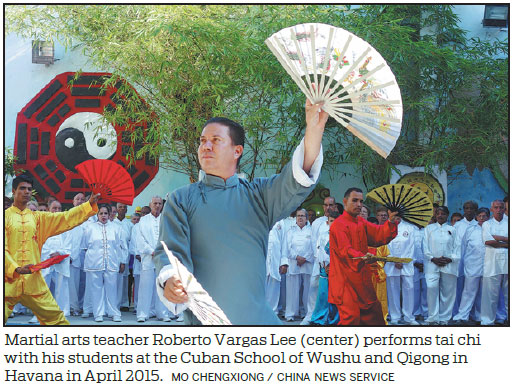Martial artist is a master of Chinese culture in Cuba
HAVANA - Every morning, 53-year-old Roberto Vargas Lee walks through the streets of Havana's Chinatown to a martial arts school that he founded over 20 years ago.
He has dedicated two decades to promoting the wushu discipline, along with qigong, a traditional Chinese exercise that exploits the human body's inner energy to achieve both physical and mental harmony.
When he was a child, his mother used to take him to her Cantonese opera performances at the Chung Wah Home, an organization made up of Chinese immigrants and their descendants.
"She learned (Cantonese opera) from my grandfather, who was a Chinese immigrant from Zhongshan city, in the province of Guangdong," Vargas Lee explains following a training session.

The master, as his students respectfully call him, has long been attracted to Chinese culture, and since founding the Cuban School of Wushu and Qigong, he has become the country's leading promoter of wushu, which currently has over 6,000 practitioners in Cuba.
As a fan of Bruce Lee's films during his youth, Vargas Lee became the first Cuban to be sent to study wushu at the Beijing Institute of Physical Education (now the Beijing Sport University) in 1994.
"I really fell in love with Chinese culture while I was studying in Beijing, and it went well beyond sports. I also had the good fortune to meet my wife there, who is from Shanghai," he says.
The couple married in Havana in 1996.
Upon his return to Cuba, he was determined to share what he had learned, especially how Chinese martial arts can be both a competitive sport and a way to keep senior citizens in good health.
It has been a fulfilling journey. Since 2001, his students have won multiple international competitions and Vargas Lee, who speaks perfect Mandarin, has accumulated many cherished memories such as meeting Fidel and Raul Castro, as well as the current Cuban President, Miguel Diaz-Canel.
The wushu master splits his daily activities in two: teaching wushu and also managing the Tientan Restaurant, among places with the best Chinese food in Havana.
The school is housed in an old cinema, and it has become a center for the dissemination of Chinese culture in Havana.
On Tuesdays and Thursdays, instructors of all ages and from all over Havana and its surrounding areas meet with Vargas Lee to keep up with the latest techniques before going to teach their respective classes.
Every day, the class begins with the Cuban and Chinese national anthems, followed by the school anthem which speaks about the virtues of practicing wushu and having Chinese heritage in Cuban culture.
"I always thank my students for embracing Chinese culture," says Vargas Lee, who is at level six in the Duan system in wushu and also has a fifth-degree black belt in Jyoshinmon Karate-Do, among others.
All these accolades have not changed his humble nature, however.
Vargas Lee's older disciples, such as Domingo Antonio de la Pena, 75, have only words of praise for him.
"The most remarkable thing about him is his teaching method. He knows how to make people feel good and give them confidence," said Pena, a practitioner of wushu for 12 years.
Margaret Espinosa, a young teacher, highlighted the way in which Vargas Lee helps people stay in harmony with themselves and with nature, using Chinese culture as a guide.
"We have learned from him to have discipline based on harmony, on peace, on relating more to nature, and moving our vital qi," Espinosa says.
Xinhua
(China Daily Global 11/07/2019 page14)


















